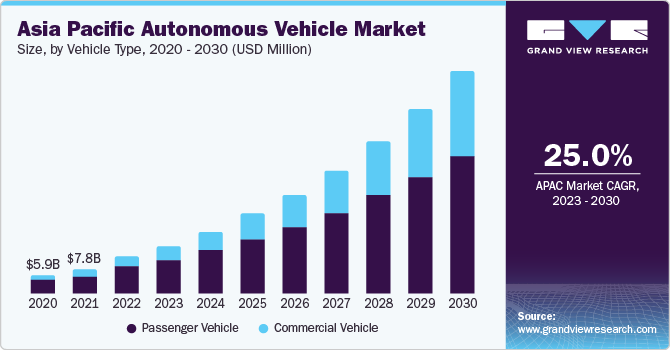Key Vehicle Type Trends Shaping the Autonomous Vehicle Market

The global autonomous vehicle market was valued at USD 42.37 billion in 2022 and is anticipated to grow at a compound annual growth rate (CAGR) of 21.9% from 2023 to 2030. Key advancements in artificial intelligence (AI), connectivity, and sensor technologies are critical to the market's growth. These innovations enable vehicles to make informed decisions and navigate complex environments more efficiently. As a result, vehicle safety and reliability are significantly enhanced, while the range of autonomous applications expands across various industries, including logistics, transportation, ridesharing, and delivery services. The cost-efficiency brought about by these technological advancements makes autonomous solutions increasingly attractive to businesses looking for innovative offerings that provide a competitive edge, thereby propelling market expansion and adoption.
The surge in delivery demands, largely driven by the rapid growth of e-commerce, has created a pressing need for faster and more efficient logistics solutions. Autonomous vehicles, including drones and self-driving delivery vans, have the potential to optimize last-mile delivery processes, effectively addressing the rising expectation for quick and reliable shipments. These vehicles are designed to optimize routes, reduce operational costs, and deliver goods more swiftly, aligning with the objectives of e-commerce companies that aim to meet customer expectations for rapid shipping. As the reach of e-commerce continues to expand, the demand for innovative logistics solutions intensifies, prompting increased investment and research in autonomous technologies. This, in turn, accelerates the advancement and adoption of autonomous vehicles within the e-commerce supply chain.
Gather more insights about the market drivers, restrains and growth of the Autonomous Vehicle Market
Vehicle Type Insights
In terms of vehicle type, the passenger vehicle segment dominated the market, holding a substantial share of 71.4% in 2022. There is a growing consumer interest in more convenient, safe, and efficient transportation options. Autonomous vehicles promise a hands-free and stress-free commuting experience, appealing to individuals who seek a more relaxed and productive travel environment. Continuous advancements in autonomous vehicle technology—such as improved sensors, sophisticated AI algorithms, and enhanced connectivity—have made autonomous passenger vehicles increasingly feasible and reliable. These developments instill confidence in consumers regarding the safety and performance of these vehicles, further driving interest in their adoption.
The commercial vehicle segment is also experiencing significant growth. Various industries, including commercial transportation, logistics, and delivery services, are increasingly recognizing the advantages of autonomous technology in improving their operations. The potential to streamline commercial logistics, optimize supply chains, and meet escalating customer demands is fueling the adoption of autonomous solutions within commercial fleets. A growing ecosystem of technology developers, manufacturers, and investors is committed to advancing autonomous systems for commercial applications. Ongoing innovation and investment in this sector will continue to drive the development and deployment of more sophisticated autonomous commercial vehicles.
Order a free sample PDF of the Autonomous Vehicle Market Intelligence Study, published by Grand View Research.
- Art
- Causes
- Crafts
- Dance
- Drinks
- Film
- Fitness
- Food
- Games
- Gardening
- Health
- Home
- Literature
- Music
- Networking
- Other
- Party
- Religion
- Shopping
- Sports
- Theater
- Wellness
- IT, Cloud, Software and Technology


